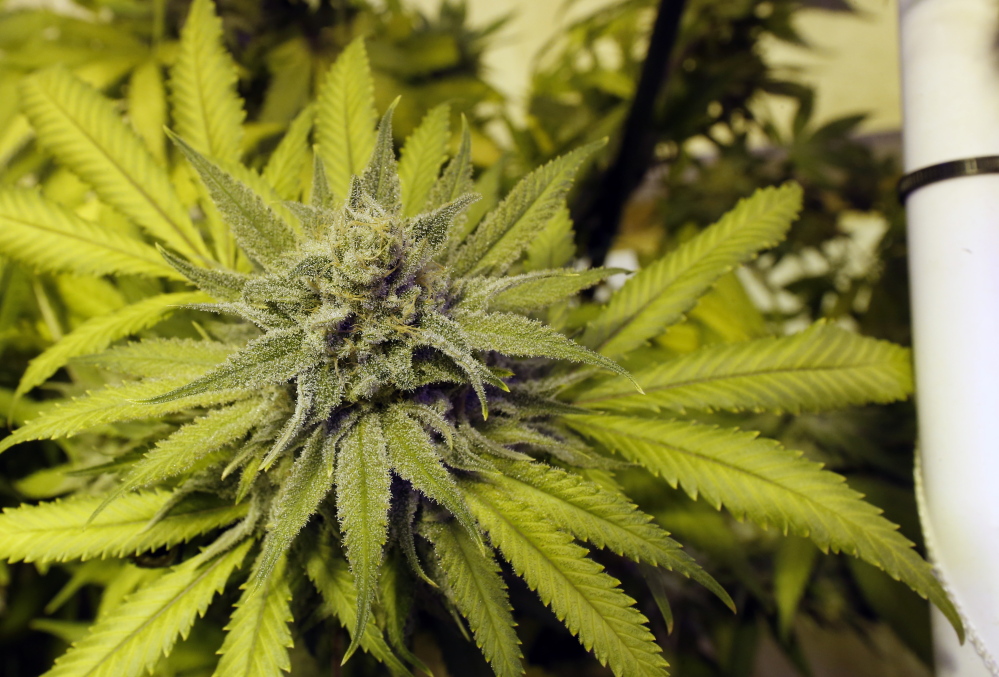A Maine Department of Health and Human Services official defended the agency’s decision to hire former law enforcement officers to investigate medical marijuana caregivers, saying the department is obligated to follow up on complaints made by the public but lacked the manpower to do so.
The move by DHHS comes as several lawmakers are aiming to address an even bigger gray area in the state’s medical marijuana program: whether the agency has the authority to conduct periodic inspections of the more than 1,700 caregivers legally growing pot for patients.
“There have been questions about whether (inspectors) can legally visit them or not, and this would take care of that,” said Sen. Tom Saviello, R-Wilton, sponsor of one of two bills to give the agency clear authority to inspect medical marijuana growers even when there are no complaints.
DHHS SAYS IT HAS INSPECTION POWERS
Last week, some advocates for Maine’s medical marijuana industry reacted with alarm to news that DHHS had signed a one-year, $167,000 contract on March 1 with the Maine Sheriffs’ Association to investigate complaints against caregivers. The advocates suggested the department overstepped its authority by implementing an inspection program without going through the public rulemaking process.
DHHS spokesman David Sorensen said Monday that the department regularly hires contractors to perform all types of services and that the medical marijuana “program compliance specialists” were no different. He also rejected the charge that DHHS did not have authority to carry out the inspections, which are voluntary.
“This is well within the authority of the department and it is certainly in the vested interest of the Maine Medical Marijuana Program,” Sorensen said. “The department can do complaint follow-ups, and that is exactly what we are doing. The department has an obligation not only to the medical marijuana caregivers and dispensaries and patients, but also to the people of Maine.”
Sorensen could not provide specifics about the number or types of complaints DHHS has received.
Maine voters first legalized the limited use of marijuana for medicinal purposes in 1999 and significantly expanded the law a decade later. The 2009 ballot initiative ordered the state to set up a regulated system of marijuana dispensaries and caregivers to supply patients with the drug. Caregivers are allowed to provide marijuana to five patients at a time, cultivating up to six mature plants for each of them. They can also possess up to 2.5 ounces of prepared marijuana per patient as well as up to 8 pounds of “harvested, dried unprepared marijuana in varying states of processing.”
OPERATIONAL REVIEW, NO ARRESTS
The four “program compliance specialists” hired through the Maine Sheriffs’ Association are only empowered to respond to complaints received by DHHS and do not have the power to arrest or file criminal complaints against any violators, DHHS said. Instead, they are working as civilian inspectors who will forward their findings to DHHS. Also, the caregivers are not obligated to open their doors to the inspectors, and it remains unclear what recourse DHHS has if the inspector is refused entry.
Sagadahoc County Sheriff Joel Merry, president of the Maine Sheriffs’ Association, acknowledged that inspectors will look at the entire operation and not restrict the inspection to the original complaint. The sheriff’s group responded to a DHHS “request for proposals” to assist with the complaint investigations. He said the inspectors, all of whom are former law enforcement officers, have conducted about 10 visits so far and that all of those were “very straightforward” and non-adversarial.
“This is a bit of an evolving process as more and more caregivers come on line,” Merry said. “What I have heard … in general is there doesn’t seem to be a lot of regulation around this.”
Each inspector will carry a photo ID issued by DHHS and the Maine Sheriffs’ Association identifying them as a “program compliance specialist” who is authorized to “enforce” compliance with Maine’s medical marijuana laws, according to a copy of an ID provided to the Portland Press Herald.
BILLS TRY TO CLARIFY DHHS AUTHORITY
Even with the four compliance specialists, there are questions about whether Maine’s law has the regulatory teeth needed to keep up with the growing number of caregivers cultivating marijuana for patients.
The section of law detailing how inspections of caregiver operations would be handled – dubbed “onsite assessments” – is empty because earlier language was repealed. Under the “compliance section,” the law states that DHHS “may take action necessary to ensure compliance with this chapter, including, but not limited to, collecting, possessing, transporting and performing laboratory testing on soil and marijuana plant samples, and samples of products containing marijuana from registered primary caregivers and registered dispensaries to determine compliance with this chapter and for evidence purposes.”
Two bills pending in the Legislature aim to clarify the department’s authority.
The first, L.D. 726 sponsored by Saviello, would allow the department “to enter the cultivation facility at any time, without notice, to carry out an inspection” and would direct the department to develop rules addressing such issues as minimum record-keeping requirements for how caregivers dispose of excess marijuana.
L.D. 1258, the second, broader bill sponsored by Republican Rep. Deborah Sanderson of Chelsea, also would allow inspectors to visit caregivers who are cultivating plants for three or more patients, but would require DHHS to notify the caregivers at least 24 hours in advance.
The bills will be reviewed by the Legislature’s Health and Human Services Committee, on which Sanderson serves. Public hearings have not yet been scheduled for the bills.
Kevin Miller — 791-6312
kmiller@pressherald.com
Twitter: KevinMillerPPH
Send questions/comments to the editors.



